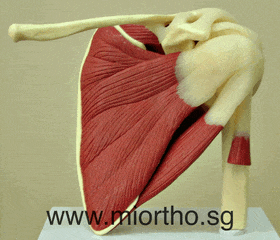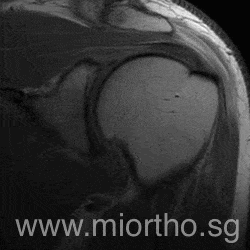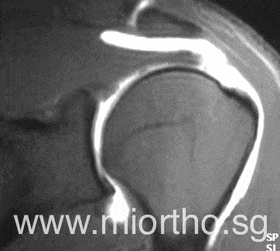The rotator cuff muscles are a group of muscles that arise from the shoulder blade and surround the shoulder joint. They are responsible for the fine movements of the shoulder, such as internally and externally rotating the arm, as well as helping to keep the shoulder joint in place as the arm is lifted overhead.
The 4 main muscles of the rotator cuff are the (1) supraspinatus, which lies on top, (2) subscapularis, which lies in front and mainly controls internal rotation (such as to scratch our backs), (3 & 4) infraspinatus and teres minor, which lie behind and control external rotation (such as reaching away to pick something up).

All of the rotator cuff muscles start as fleshy muscles from the shoulder blade (the red portions shown in the model above), and as they insert into the top of the arm bone at the shoulder joint, they turn into white, tough "tendons" (the white portions). Most rotator cuff problems occur at the tendon part of the muscle.


The rotator cuff tendons can be injured due to forceful injuries such as falls or sudden heavy lifting, or they may be damaged due to years of repetitive movements that may occur in certain jobs. They are also susceptible to wear and tear with age. For this reason, most people with rotator cuff tendon problems start to notice shoulder symptoms in their 40s and 50s. The tendons may either have tendinosis (or "wear and tear") causing pain, or they may develop partial or full thickness tears, which result in pain and possibly loss of movement and strength. The picture on the left shows an intact supraspinatus tendon attaching to the top of the humerus (arm bone), while the picture on the right shows a complete tear of the supraspinatus tendon.
Critical in the management of rotator cuff problems is a proper detailed assessment with history taking and clinical examination. Often, an ultrasound scan or an MRI scan may be required to confirm if there is a rotator cuff tear.
Click here to learn more about treatment of rotator cuff problems.
Back to main patient information.
